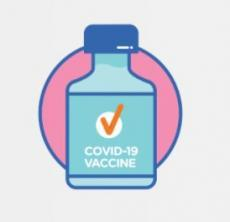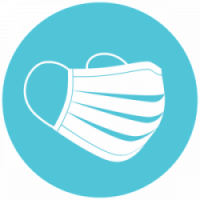As we are currently facing increasing cases of community transmission, we will try to provide you with the latest information about how you can keep yourself and your family safe, and find out what support is available.
Ways to reduce risk
- Physical distancing – try to avoid crowds and keep your distance where possible from people who are not part of your household.
- Wear a face mask - wherever possible around others (people with MND can be exempt but if you’re able to wear a mask it is recommended). See below for further details about types of masks available.
- Good hygiene – this includes washing your hands and covering any coughs and sneezes.
- Stay home - If you are self-isolating or just staying at home, you may want to organise home deliveries of food and medications.
- Symptoms - If you experience any coronavirus symptoms you should not go out, you must self-isolate and get tested for the virus if you’re able to.
- Carers and health and community care providers who work with people with MND should also take precautions to reduce their risk of contracting or spreading the virus.
- Talk with your MND Advisor, NDIS Support Coordinator or home care package providers to communicate your needs and expectations about precautions to keep you and your family safe when providing services at home.
Vaccinations
The Australian Department of Health encourages everyone to be vaccinated as this is the best way to protect against Covid-19. Having a COVID-19 vaccine will lower your chance of getting sick or having a serious illness. People living with MND are listed as a priority medical condition.
There is no known conflict between the vaccines and MND. The Association of British Neurologists recommends people with neurological conditions accept whichever vaccination they are offered without delay, unless they have a specific contraindication such as severe allergy.
Your GP or neurologist can answer any specific questions you may have about your personal circumstances and the vaccines. To find out where you can receive your vaccine and to book an appointment, please see Service Finder (healthdirect.gov.au)
Types of Vaccine
Pfizer (Comirnaty), AstraZeneca (Vaxzevria) and Spikevax (Moderna) are the vaccines currently available in Australia. These vaccines have been rigorously assessed by the Therapeutic Goods Administration to make sure they are safe and effective. Millions of people around the world have safely received these vaccines. This includes very old adults, people living in aged care facilities, and people with chronic medical conditions. COVID-19 vaccination – Easy Read resources
The current recommendations in Australia are:
- the AstraZeneca vaccine for people aged 18 years and over. You will need two doses, the second dose should be given between 4 to 12 weeks after the first dose.
- the Pfizer vaccine for people aged 5 years and over. People aged 12 years and older need 2 doses of the Pfizer vaccine, given between 3 and 6 weeks apart. Children aged 5 to 11 years need 2 doses of Pfizer for children (one third the adult dose), given 8 weeks apart unless advised by a medical professional.
- the Moderna vaccine for people aged 12 years and over. You will need 2 doses of the Moderna vaccine, given at least 4 weeks apart.
Vaccine concerns
Most side effects are mild and go away in a couple of days. In Australia the Therapeutic Goods Administration (TGA) monitors vaccine safety and side effects. COVID-19 vaccine safety and side effects | Australian Government Department of Health
For details on possible side effects for each vaccine, see:
Vaccine boosters
Anyone aged 18 years and over who received their second dose of a COVID-19 vaccine over 3 months ago is now eligible for a booster vaccination. Currently the Therapeutic Goods Administration (TGA) has approved the Pfizer and Moderna vaccine for the booster dose, regardless of which vaccine you received for your primary doses.
See the FAQs page for further information and for booking appointments: Booster vaccination - frequently asked questions and Booster vaccination | NSW Government
Face masks
Evidence shows that wearing a face mask helps reduce the risk of spreading the coronavirus to others and from becoming sick ourselves. But there has been little guidance on what kind of masks provide the best protection. When deciding how effective a face mask is in protecting you, the most important things are:
- The level of filtration
- How well it fits and
- How comfortable it is to wear
Early on in the pandemic the World Health Organization told the public not to wear higher grade masks, the type that are made from high-tech synthetic fibres and provide a high level of protection against viruses that are spread in the air via aerosols. That was because there was a shortage of these masks at the time — and health care workers desperately needed them. There are now a wide range of high-filtration masks on the market that are widely available and relatively affordable.
Some scientists are now recommending that people use these higher level of protection masks rather than the cloth masks, especially when you are in higher risk situations or at higher risk of severe disease. These higher protection masks are called P2 (or N95) masks and have a higher level of filtration than cloth or surgical masks. They are available as single use, or reusable with changeable filters, but ensure you buy them from reputable companies or brands. Wearing any type of mask is still better than no mask, but to find out more about the different mask types please see below:
CBS News in the US aired this interview on December 11 with Aaron Collins, a mechanical engineer with an interest in aerosol science. Aaron tests and reviews different mask types available in the US for their effectiveness in preventing aerosols. Watch the CBS interview here: Some experts recommend face mask upgrades - CBS News or watch Aaron’s YouTube reviews here: Aaron Collins - YouTube
You may also want to read this article recently published in Scientific American Why We Need to Upgrade Our Face Masks - and Where to Get Them
NSW Health provides an explanation of P2 (N95 equivalent) masks: This information was written for bushfire smoke but the filtration and effectiveness of the masks is essentially the same - P2 mask - Fact sheets (nsw.gov.au).
The Australian Government Department of Health website currently states that its guidance is under review, and so please bear in mind that the following information is from 2020 or early 2021. Are cloth face masks likely to provide protection against COVID-19? and coronavirus-face-masks-how-they-protect-you-and-when-to-use-them
Where to buy high filtration masks in Australia: Where to buy KN95 masks online in Australia | Finder or Australia's Cheapest Online Pharmacy (chemistwarehouse.com.au)
Further information
National coronavirus and COVID-19 vaccine helpline
Call if you need information about COVID-19, COVID-19 vaccines or help with the COVIDSafe app. The helpline is unable to book appointments on your behalf.
Ph: 1800 020 080
Web: COVID-19 vaccine enquiries
Information for people with disability
People with disability and disability workers are eligible to receive the COVID-19 vaccine. Some people with disability are at greater risk of becoming very sick if they catch COVID-19, so getting vaccinated is very important. See the Department of health website here: Information for people with disability about COVID-19 vaccines
Information for Aboriginal and Torres Strait Islander peoples
All Aboriginal and Torres Strait Islander people aged 16 and over can access a COVID-19 vaccine. Check with your local GP or healthcare worker to make an appointment. For more information, see the Department of Health website here: Information for Aboriginal and Torres Strait Islander peoples about COVID-19 vaccines

Explainer videos
Department of Health
- Professor Alison McMillan, Chief Nursing and Midwifery Officer, answers the Top Three questions asked to the Department of Health on social media in June 2021.
Watch the video here: Top 3 COVID-19 vaccine questions – AstraZeneca for under 60s, over 60s, and side effects - Dr Lucas de Toca, COVID-19 Primary Care Response First Assistant Secretary, answers questions asked to the Department of Health on social media in June 2021.
Watch the video here:Top 3 COVID-19 vaccine questions – New ATAGI advice, second doses, and Pfizer access
OPAN video series – with Dr Norman Swan
11 videos with Dr Norman Swan, were made in response to questions received by The Older Persons Advocacy Network (OPAN). Topics covered include:
- Known issues with other vaccines or medications
- The known side effects
- Risks individuals take by not being vaccinated
- How does the right to choose affect people with reduced capacity or dementia?
- How will people learn they can get the vaccine?
You can watch these videos here: COVID-19 Vaccination - What You Need to Know (opan.org.au)
Support organisations
MND Australia
State MND Associations and MND Australia are continuing to provide support services to people living with MND and their families, including equipment delivery. To limit the risk of COVID-19, some state MND Associations have moved to providing some services online via video conferencing or via telephone and email. Some states and services will be available face-to-face in a COVID safe way and in accordance with the current COVID-19 regulations in your area.
To see the latest national updates, visit the MND Australia COVID-19 webpage (which also has information detailing what you should do if you have respiratory muscle weakness, use non-invasive ventilation/cough assist or notice problems with your breathing): MND Australia - COVID-19 and MND
If you have specific questions regarding your support needs, please contact your health care provider, MND Advisor, NDIS Support Coordinator or our MND NSW Information Line.
The Disability Gateway
If you are worried or concerned about COVID-19, you can get support on this website or call the Disability Gateway. The Disability Gateway is a free service available Monday to Friday 8am to 8pm (AEST).
Ph: 1800 643 787
Web: COVID-19 support
Beyond Blue - Wellbeing Support Service
Beyond Blue are providing information, advice and strategies to help you manage your wellbeing and mental health during the COVID-19 pandemic.
Ph: 1800 512 348
Web: Beyond Blue Coronavirus Mental Wellbeing Support Service
The Older Persons Advocacy Network
The Older Persons COVID-19 Support Line provides information and support for older Australians, their families and carers. You can call for extra support or if you have questions about the COVID-19 restrictions.
Ph: 1800 171 866
Web: Home - Older Persons Advocacy Network (opan.org.au)
Translating and Interpreting Service (TIS National)
TIS National is for people who do not speak English and for agencies and businesses that need to communicate with their non-English speaking clients.
Ph: 131 450
Web: Translating and Interpreting Service (TIS National)
COVID-19 vaccine information in community languages
Information about COVID-19 vaccines has been translated into multiple languages by the Department of Health. Find information in your language here: COVID-19 vaccine information in your language
Multilingual Older Persons COVID-19 Support Line
Available Monday to Friday between 2pm and 5pm Melbourne time (except public holidays), click on the language to read more.
1800 549 844 – Italian
1800 549 845 – Greek
1800 549 846 – Vietnamese
1800 549 847 – Mandarin
1800 549 848 – Cantonese
1800 549 849 – Arabic


